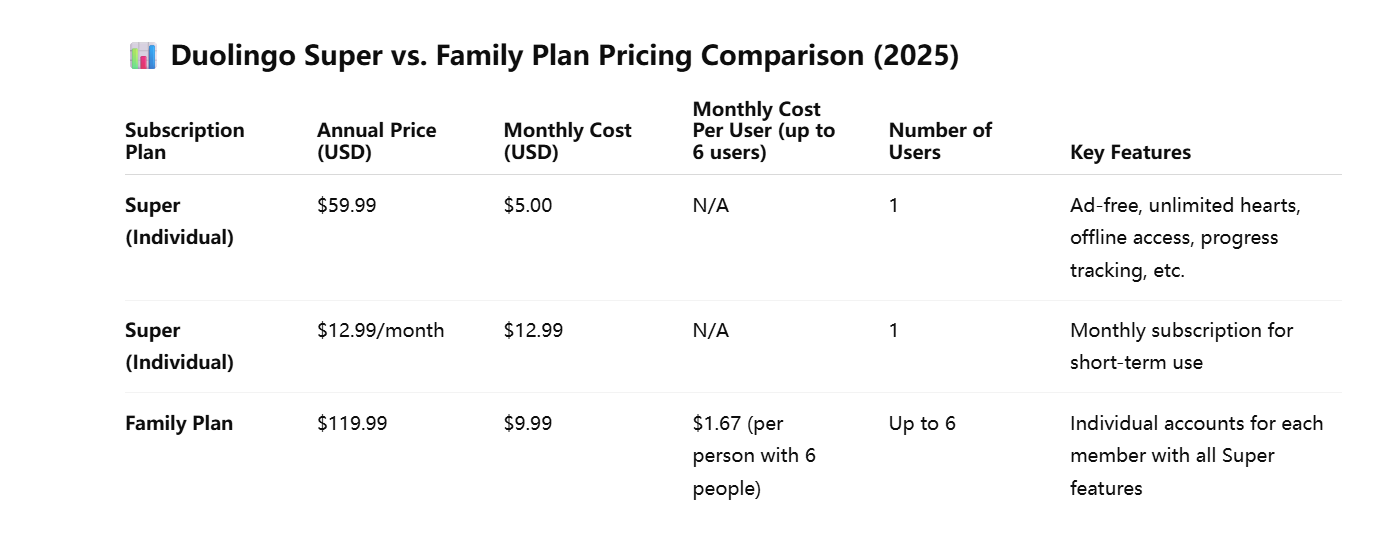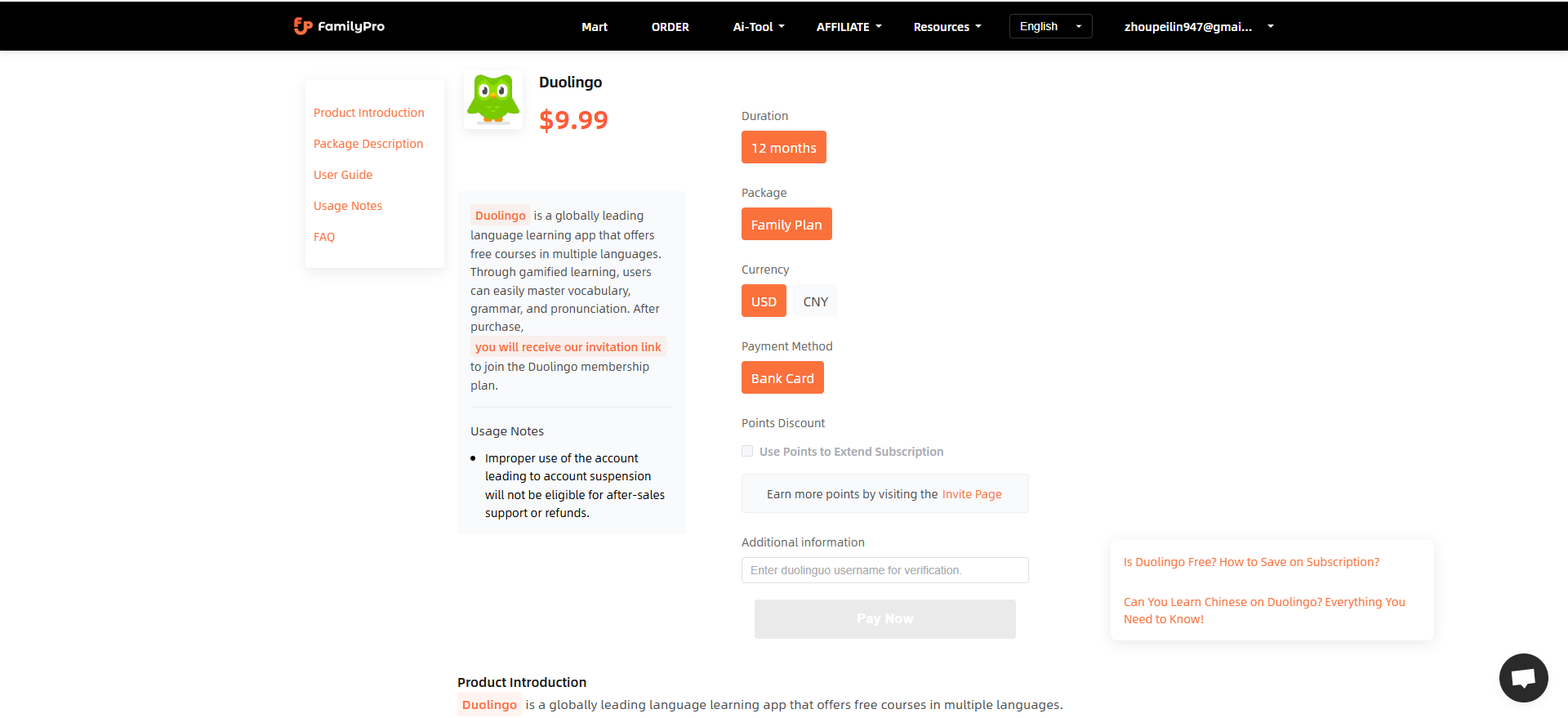Does Duolingo Work? A Deep Dive into the Popular Language Learning App
In the modern world, learning a new language is no longer limited to classroom instruction or expensive language tutoring. With apps like Duolingo, mastering a new language has become more convenient, fun, and affordable. But there's one question on everyone's mind: Does Duolingo really work? Does this popular app live up to its reputation as an effective language learning tool? Can I achieve my learning goals by using this tool? Is it suitable for my current level? Many of the user's questions can be found in the following answers!
Features of Duolingo
Gamified teaching method
Duolingo is a language-learning platform that offers free and paid courses in over 30 languages. It uses a gamified approach to make learning engaging and fun. The app has a wide range of interactive exercises, including vocabulary quizzes, grammar lessons, and speaking tasks, making it accessible to users of all ages and learning levels.
Modular learning
Duolingo divides language learning into small modules, and the learning content of each module is not long and easy to digest. This short and flexible learning method is very suitable for busy people, who can take a few minutes to study at any time without feeling too stressed.
Personalized learning progress
Duolingo will adjust the difficulty of subsequent courses based on the user's learning progress and performance. If you don't have a firm grasp of a certain knowledge point, the system will automatically increase the number of exercises to help you consolidate your learning results. This personalized learning experience allows each user to learn at their own pace.
Social attributes
Duolingo also provides social functions, where users can compare and challenge with friends, or join study groups. By interacting with others, learners can increase motivation, share learning progress, and encourage each other. At the same time, Duolingo is an app with social attributes, with rich and varied icons and hot topics. In people's lives, it not only serves as a learning software, but also as a social product. ![]()
Does Duolingo Actually Work to Help You Learn a Language?
Yes, Duolingo can work for language learning—but its effectiveness depends on your goals and the level of fluency you want to achieve. Let's break down the pros and cons to see how it helps learners at different stages.
Stimulate your interest in language learning As mentioned before, Duolingo's playfulness and modular learning make it possible for people to learn a language without the worries and pressure of attending classes. You don't have to focus on books for a long time, face boring content full of text, or force yourself to read and memorize carefully. Therefore, when using Duolingo to learn, it can greatly stimulate your interest, just like playing a game, which makes you always think about completing tasks, achieving achievements and getting rewards.
Quickly master spoken language If you plan to travel to a certain country in a few months, you can use Duolingo to quickly master the simple spoken language of that language in these few months, so that you can better communicate and experience the local customs and practices during your travels. Duolingo's oral training can meet your daily needs when traveling to a certain country. Although you may not be able to remember much, or suddenly forget it when using it, Duolingo brings users a happy experience.
Weaknesses of Duolingo
Limited Depth for Advanced Learners Although Duolingo is very suitable for beginners, it is not deep enough for intermediate or advanced learners. After mastering the basics, it may not meet your learning needs. The grammar and spelling exercises are relatively weak, and users cannot practice them specifically, which gives users a sense of frustration that they have studied for a long time but cannot write a complete sentence.
Lack of Real-Life Conversation Practice One of the biggest drawbacks of Duolingo is that it doesn't simulate real-life conversations very well. This app focuses mainly on translating phrases and vocabulary. As mentioned above, it is suitable for travelers to quickly master some daily words and phrases for simple use during travel. However, for users who need to use the language for a long time and communicate with local residents, this does not always reflect the way the language is used in daily natural language. The assessment of oral English is relatively loose, which is a good experience for entertainment users, but for users who have high requirements for oral English practice, Duolingo is difficult to meet their standards.
Who Should Use Duolingo?
- Beginner Learners If you're starting to learn a new language, Duolingo is a fantastic choice. It's perfect for beginners because it breaks down language learning into small, digestible lessons. Duolingo introduces you to basic vocabulary, simple sentence structures, and pronunciation, making it easier for newcomers to start their language journey. The app uses repetition and gamification to reinforce lessons, helping you build a solid foundation without overwhelming you.
- Casual Learners Duolingo is perfect for casual learners who want to learn at their own pace without the pressure of formal education. The app allows you to practice anytime, anywhere, making it perfect for learning in fragmented time. Whether you're learning for fun or as a hobby, Duolingo provides you with a flexible and easy way to practice your language, whether it's during your commute, while relaxing at home, or during your lunch break.
- People Looking to Reinforce Their Basic Skills Duolingo is a great tool for those who already have some knowledge of the language but want to brush up on their basics. The app's structured lessons cover a wide range of topics, and you can jump straight to the next lesson to review or reinforce what you already know. It's also a great option for those who want to keep up their language skills through daily practice without committing to a full-time course.
- Families and Groups Duolingo is also a great choice for families or groups who want to learn together. The Duolingo Family Plan allows up to 6 users to share a subscription, allowing families to learn a language together at an affordable price. The app's gamification elements, such as competing for streaks or completing challenges together, can make language learning a fun and social activity.
How Does Duolingo Compare to Other Language Learning Tools?
Duolingo stands out for its free option and gamified experience, but it also has its limitations compared to other language learning platforms like Babbel, Rosetta Stone, or Memrise. These apps usually offer more structured lessons with a stronger focus on conversation skills and grammar.
Babbel is known for its more structured lessons and focus on conversation.
Rosetta Stone emphasizes immersion, which might be better for those looking to develop a natural understanding of the language.
Memrise offers a similar approach to Duolingo but with a stronger emphasis on video-based learning and vocabulary recall.
What is the Duolingo Family Plan?
In order to improve learning efficiency and user experience during the use of Duolingo, we are likely to open a Plus membership,At the same time, you should note that membership prices vary in different regions,If you're considering Duolingo Plus but are worried about the cost, the Duolingo Family Plan offers a budget-friendly solution. This plan allows up to 6 users to share a single Duolingo Plus subscription, which makes it perfect for families or groups of friends who want to learn together without each person having to pay for an individual subscription.

Benefits of the Duolingo Family Plan
Affordable Group Learning: The Duolingo Family Plan allows multiple users to enjoy all the premium benefits of Duolingo Plus, such as ad-free learning, offline access, and personalized reviews, at a significantly reduced price compared to purchasing individual subscriptions.
Share with Family and Friends: Up to 6 people can share a single subscription, making it a great choice for families who want to learn together. Whether you're a family of language enthusiasts or a group of friends looking to expand your language skills, this plan offers excellent value.
Easy to Manage: The primary account holder can manage the subscription and add or remove users. This makes it easy to keep track of who's using the account and ensure everyone gets the most out of the app.
Save Money: Instead of paying for individual Duolingo Plus subscriptions, the Family Plan offers a cost-effective way to enjoy all the premium features. If you're a family or group, this is a smart way to maximize your budget while providing everyone with access to high-quality language learning.
If you don't have any family or friends who want to use Duolingo membership, you can use Familypro to help you join, and you can enjoy full membership benefits at the price of a family plan!

Does Duolingo Work? — Frequently Asked Questions
Does Duolingo really help you learn a language?Yes, Duolingo is effective for beginners and casual learners. It helps build vocabulary, understand basic grammar, and develop reading and listening skills. However, to achieve fluency, it should be combined with speaking practice, writing exercises, and real-world exposure.
Can Duolingo make you fluent?Not on its own. While Duolingo builds a strong foundation, it lacks depth in conversation practice, cultural context, and complex grammar. Fluency requires speaking with native speakers, writing regularly, and immersing yourself in the language through media and daily use.
How long does it take to see results with Duolingo? It depends on your goals. For basic vocabulary and sentence structures, you can see progress in a few weeks with daily practice. For conversational skills and fluency, you'll need months or years and additional resources.
What is the Duolingo Family Plan? The Duolingo Family Plan is a cost-effective subscription option that allows up to 6 people to share premium benefits under one account. It's great for families or friend groups looking to learn together while saving money.
How should I supplement Duolingo for better results?
- Use apps like HelloTalk or Tandem to talk with native speakers
- Watch movies, listen to podcasts, or read books in your target language
- Take speaking or writing lessons online (e.g., italki, LingQ)
- Practice thinking in the target language daily
Does Duolingo work?Yes, it works — for building a foundation. Use Duolingo to start your journey, then branch out with immersive tools and real-world practice to achieve fluency.
Conclusion: Does Duolingo Work?
Yes, Duolingo works—but it's most effective for beginners or casual learners who want to build a basic understanding of a language. It's an engaging and flexible tool that makes language learning fun and accessible. However, for intermediate or advanced learners who want to reach fluency, Duolingo should be seen as a supplementary tool rather than a complete solution. If you're looking for an easy, fun, and free way to start your language-learning journey, Duolingo is definitely worth trying. Just remember, language mastery requires more than just app-based learning—it takes practice, conversation, and exposure to real-life situations. So, use Duolingo to get started, but be sure to complement it with other resources as you progress!